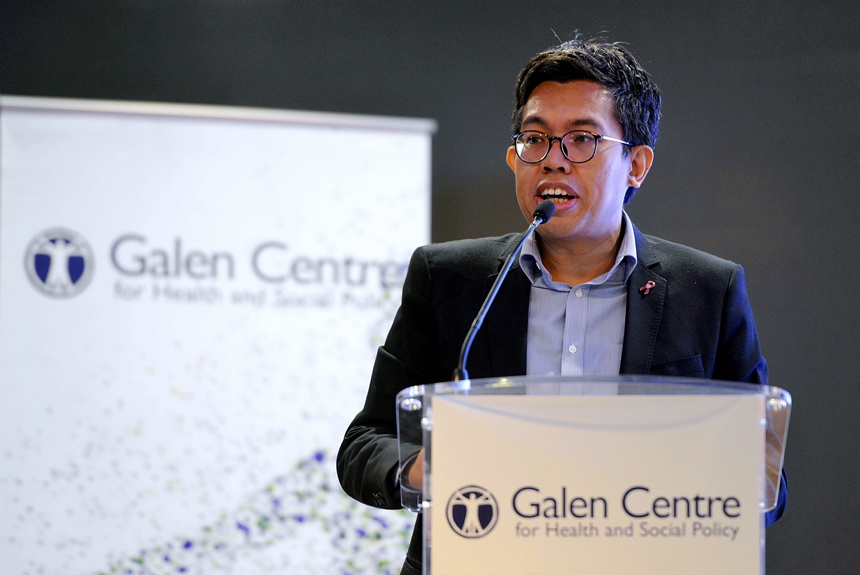KUALA LUMPUR, August 15 – The Galen Centre for Health and Social Policy today urged the government to avoid criminalising smokers and vapers from the next generation in the tobacco control bill.
The health think tank said the Dewan Rakyat special select committee (PSSC) formed to review the Control of Tobacco Product and Smoking Bill 2022 – which moots a tobacco generational end game (GEG) – should remove Clause 17 from the proposed legislation.
Section 17 of the Control of Tobacco Product and Smoking Bill 2022 prohibits anyone born on or from January 1, 2007, from smoking or vaping, and from possessing and using tobacco and vape products, punishable with a maximum RM5,000 fine upon conviction.
“We have learnt from the bitter experience of Malaysia’s war on drug abuse that the legal assault is often on the individuals who fall victims to the disease of addiction,” Galen Centre chief executive Azrul Mohd Khalib said in a statement today.
“Sixty per cent of the over 69,000 prison inmates in Malaysia are minor drug offenders, who have been convicted for consumption, use and possession of various narcotics such as marijuana.
“Even without imprisonment, Clause 17 has the potential to create enormous harm by repeating the same mistakes made during our drug war.”
During debate on the tobacco control bill during the last Dewan Rakyat meeting before it was deferred from a vote for review by the newly formed PSSC, Health Minister Khairy Jamaluddin suggested dropping the maximum fine for offences related to the GEG group to RM500 or community service in lieu upon conviction.
He also agreed to drop personal possession as an offence for the GEG group, but maintained prohibitions on smoking or vaping, as well as purchase and use of tobacco or vape products for anyone born from 2007.
“This clause makes the proposed legislation vulnerable to accusations of selective prosecution, creates stigma and discrimination, and marginalises a group of people who will need support and assistance,” Azrul said, referring to Section 17 of the tobacco control bill.
“Despite our best efforts, in the future there will be people in the GEG group who smoke and vape, and become addicted to nicotine. Should they be punished?
“The legislation should ensure that it is an offence to legally sell or supply tobacco or vape products to those born from 1 January, 2007. It should not criminalise individual possession or usage.”
Azrul pointed out that New Zealand’s Smokefree Environments and Regulated Products (Smoked Tobacco) Amendment Bill does not criminalise individual smokers from the GEG group, set in New Zealand from the 2009 generation onwards.
Unlike Malaysia, New Zealand’s GEG proposal only prohibits the sale, supply, and delivery of tobacco products to the next generation born from 2009, without any prohibitions of smoking, possession, or purchase by the individual user.
Malaysia’s GEG idea came from New Zealand that first announced last December its plans for a generational tobacco ban. New Zealand, however, is not prohibiting vape for its GEG.
Azrul today urged legislators to prevent the possibility of the Control of Tobacco Product and Smoking Bill from disproportionately affecting young people, lower-income people, and vulnerable populations.
“A person addicted to nicotine, whether a smoker or vaper, has the right to be treated equally under the law, with compassion, and dignity.”
Amid widespread opposition to enforcement powers furnished by the tobacco bill that are considered excessive by many human rights activists and lawyers, Azrul said dropping Clause 17 would address concerns regarding enforcement under Part IX of the bill and its implications to individual smokers and vapers.
Multiple MPs had also cited concerns about enforcement powers under the proposed tobacco control Act.
Powers of search and seizure without warrant, seizure of property, and access to private information, Azrul said, can then be “properly” focused on individual retailers, companies and corporations who sell, supply, and manufacture tobacco products and vape.
“Therefore, Clause 17 of the current iteration of the Control of Tobacco Product and Smoking Bill 2022 should be removed,” said the health advocate.
“The best and arguably, only chance for the Bill to finally pass, after decades of dithering, will be through this PSSC and the coming parliamentary session.
“If it fails to be passed this time around, it might be another decade before we see the kind of leadership and vision demonstrated in this attempt. It might be years before vape is finally regulated, and for tobacco consumption to finally be reduced in Malaysia.
“By that time, thousands of people would have certainly lost their lives. Billions of ringgit in health expenditure would have been spent.”








